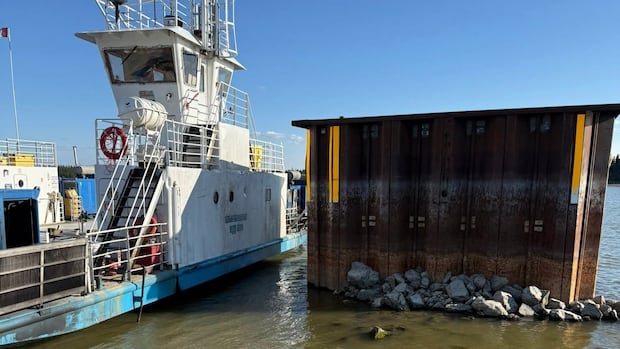York Factory First Nation 'essentially stranded' after low water levels ground ferry: grand chief
Indigenous leaders demand all-season road for northern Manitoba First Nation under state of emergency
Indigenous leaders in Manitoba want an all-season road for a northern Manitoba First Nation that's been "essentially stranded" after low water levels left its ferry grounded for more than two weeks.
York Factory First Nation Chief Darryl Wastesicoot said his community of about 300 is located between two Manitoba Hydro dams, and the Crown corporation controls the water levels on the lake.
Unprecedented low water levels this year have left his community "basically stuck," Wastesicoot said.
York Factory, about 900 kilometres north of Winnipeg, declared a state of emergency earlier this week, because the ferry has been inoperable for more than two weeks.
"It's not the first year that's been like this and it continues to happen, so we are looking for solutions here with Manitoba Hydro, but we're falling on deaf ears," he said.
At a news conference on Tuesday, Wastesicoot and several other First Nations chiefs and grand chiefs demanded that the federal and provincial governments fast track an all-season road for York Factory.
Assembly of Manitoba Chiefs Grand Chief Kyra Wilson said the issue boils down to Manitoba Hydro's control of water levels within First Nations communities, leaving places like York Factory "essentially stranded."
"What we're seeing right now is dams surrounding our First Nations communities, and they're controlling the flow through and the water levels, and it's negatively impacting our First Nations communities," she said at the news conference.
However, Infrastructure Minister Lisa Naylor said ongoing drought conditions are also contributing to the unusually low water levels that left York Factory's ferry inoperable. The province is watching the water levels and precipitation to determine when the ferry can resume service, she said.
"In the meantime, we are working closely with York Factory First Nation and the federal government to ensure that families have access to the essential supplies and resources they need," she said in a statement to CBC News on Monday.
Later on Tuesday, Naylor said the province is studying the idea of an all-season road for York Factory, but will need money from Ottawa.
"We're already engaged in an all-weather road to the future Wasagamack airport area, [so] this might be the next kind of step."
Wasagamack First Nation is about 470 kilometres northeast of Winnipeg, has a population of about 2,000 and can only be reached by boat or helicopter.
Meanwhile, Manitoba Hydro spokesperson Peter Chura said the low water levels that docked the York Factory ferry are not because of operations at the nearby Keeyask Generating Station. He also described drought as a factor, saying both the Churchill River and Lake Winnipeg basins are much drier than normal.
"As a result, water levels and flows are low on lakes and rivers throughout Manitoba," he said in a statement.
Chura also said there are "open lines of communication" between Manitoba Hydro and York Factory. He added that hydro has loaned a boat to York Factory to help with transporting people and supplies.
'Can't afford to wait'
Wastesicoot said the ferry is a critical part of York Factory's survival because winter roads are "not reliable anymore."
"We used to get three months out of it, but now we're lucky to get 30 days," he said.
Manitoba's current wildfire season has also threatened the ferry's viability, preventing the ferry from docking a few times already this year, Wastesicoot said.
"Sometimes the planes couldn't land because of the smoke," he said. "It would be devastating if we couldn't get out."
Two external studies recently commissioned by York Factory found that a 60-kilometre, all-season road for the community would cost around $150 million, Wastesicoot said.
York Factory would ideally like to return to its traditional lands, he said. The First Nation was forced to relocate to its current location in 1957.
But such a return would be costly, with an estimated $5 billion price tag, according to Wastesicoot.
"I don't think that's going to happen anytime soon."
Wastesicoot has spoken with Naylor and Premier Wab Kinew about the situation, and while both promised to meet with the chief, he said York Factory can't wait for that to happen any longer.
He expects the ferry to be out of commission until September at the latest.
"We can't afford to wait to meet with the officials who have the power to do something about it," he said.
"We live in poverty while everybody else benefits from the hydro development."
WATCH | First Nation leaders call for road access to community stranded due to low water levels:
With files from Ian Froese


